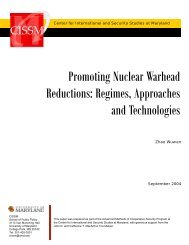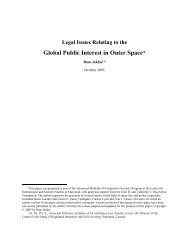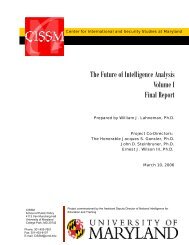A Reassurance-Based Approach to Space Security - Center for ...
A Reassurance-Based Approach to Space Security - Center for ...
A Reassurance-Based Approach to Space Security - Center for ...
- No tags were found...
You also want an ePaper? Increase the reach of your titles
YUMPU automatically turns print PDFs into web optimized ePapers that Google loves.
3) testing or using a satellite itself <strong>to</strong> inflict damage or destruction on any otherobject by direct action.The Canadian paper leaves open several important, difficult questions:1) When would it be acceptable <strong>for</strong> states <strong>to</strong> engage in non-physical means ofinterference with another country’s use of space? In other words, where is theline between those military uses of space that are “peaceful” and thus completelyprotected, and those that are not, in cases that do not fit classical conceptions oftransborder aggression or deterrence stability?2) In the event that a country uses space <strong>for</strong> aggressive, illegal, or otherwiseunprotected purposes, how should legitimate justifications <strong>for</strong> interfering withthose activities (in the name of self defense, treaty en<strong>for</strong>cement, or maintenanceof international peace and security) be weighed against the potential damage <strong>to</strong>the space environment?3) How much and what type of verification, confidence-building, and compliancemanagement arrangements would be appropriate in a regime where dual-usecapabilities could be used, albeit often at great cost, in place of dedicated spaceweapons and where inadvertent interference poses at least as much of a threat <strong>to</strong>space assets as does purposeful interference?These questions cannot be definitively answered on the basis of existing internationalspace law or traditional arms control precedents. One basic problem is that many scenariosthat concern space security experts do not fit neatly in<strong>to</strong> the concept of physical transborderaggression that shapes the U.N. Charter’s rules about the use of <strong>for</strong>ce and by extension theOST’s basic distinction between “peaceful” uses of space that enjoy the right of safe passage,and other uses that have no such protections. For instance:If Taiwan declares independence and Beijing uses <strong>for</strong>ce <strong>to</strong> reassert sovereignty over theisland, would satellites being used <strong>to</strong> support Chinese military operations have a right ofsafe passage, or not?What, if any, legal protections exist <strong>for</strong> satellites used by a country or dissident group <strong>to</strong>broadcast television messages urging citizens <strong>to</strong> overthrow their own government? 2727 UNGA Res. 37/92, “Principles Governing the Use by States of Artificial Earth Satellites <strong>for</strong> InternationalDirect Television Broadcasting,” (December 10, 1982) juxtaposes the right <strong>to</strong> seek and impart in<strong>for</strong>mation andideas with the directive <strong>to</strong> respect the sovereign rights of states and the principle of non-intervention, so itcould support either side in this scenario. http://www.un.org/documents/ga/res/37/a37r092.htm. Twoearlier accords could have some bearing. The 1936 International Convention Concerning the Use ofBroadcasting in the Cause of Peace prohibits broadcasts <strong>to</strong> incite civil unrest or international war, but theUnited States and many other countries are not parties. The 1970 Declaration on Principles of InternationalLaw Concerning Friendly Relations and Co-operation among States in accordance with the Charter of theUnited Nations, generally considered part of cus<strong>to</strong>mary law, includes the duty <strong>to</strong> refrain from propaganda <strong>for</strong>wars of aggression and the duty not <strong>to</strong> incite or support violence aimed at internal regime change in other states.19







